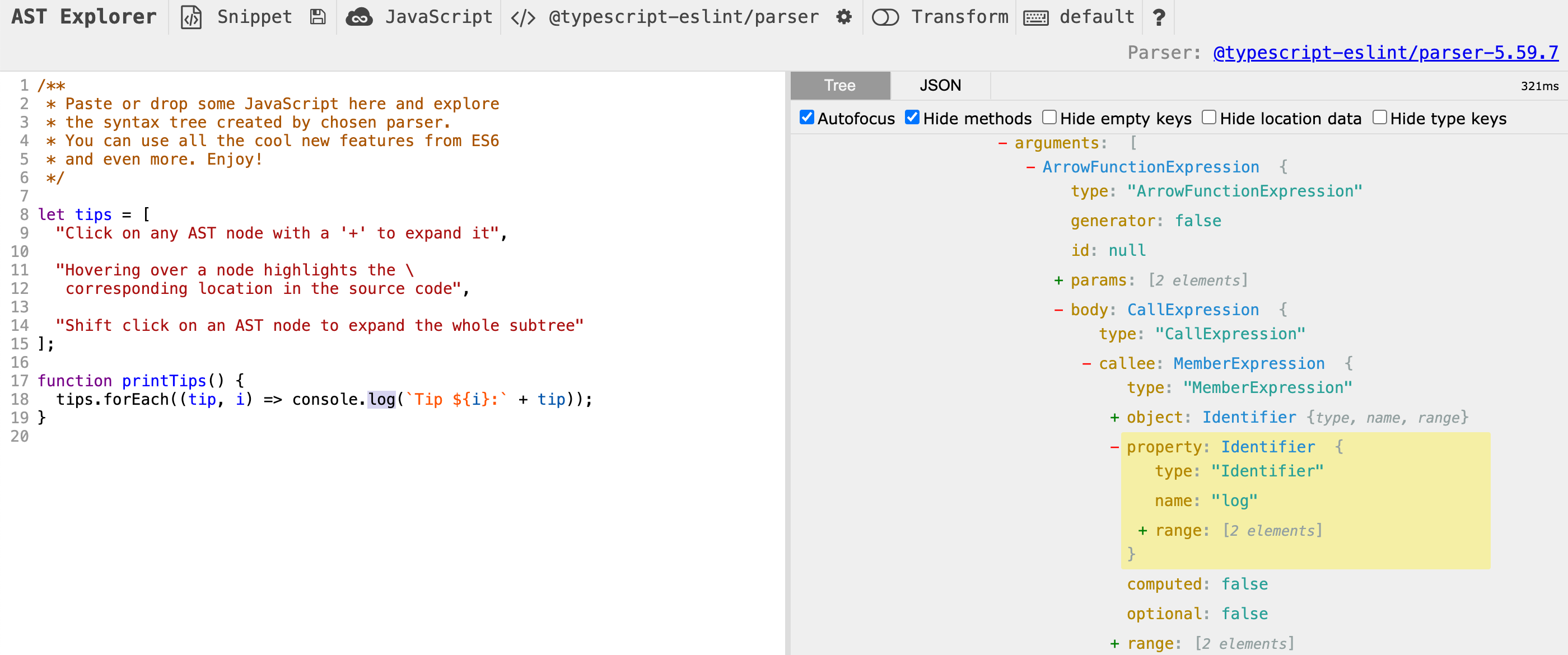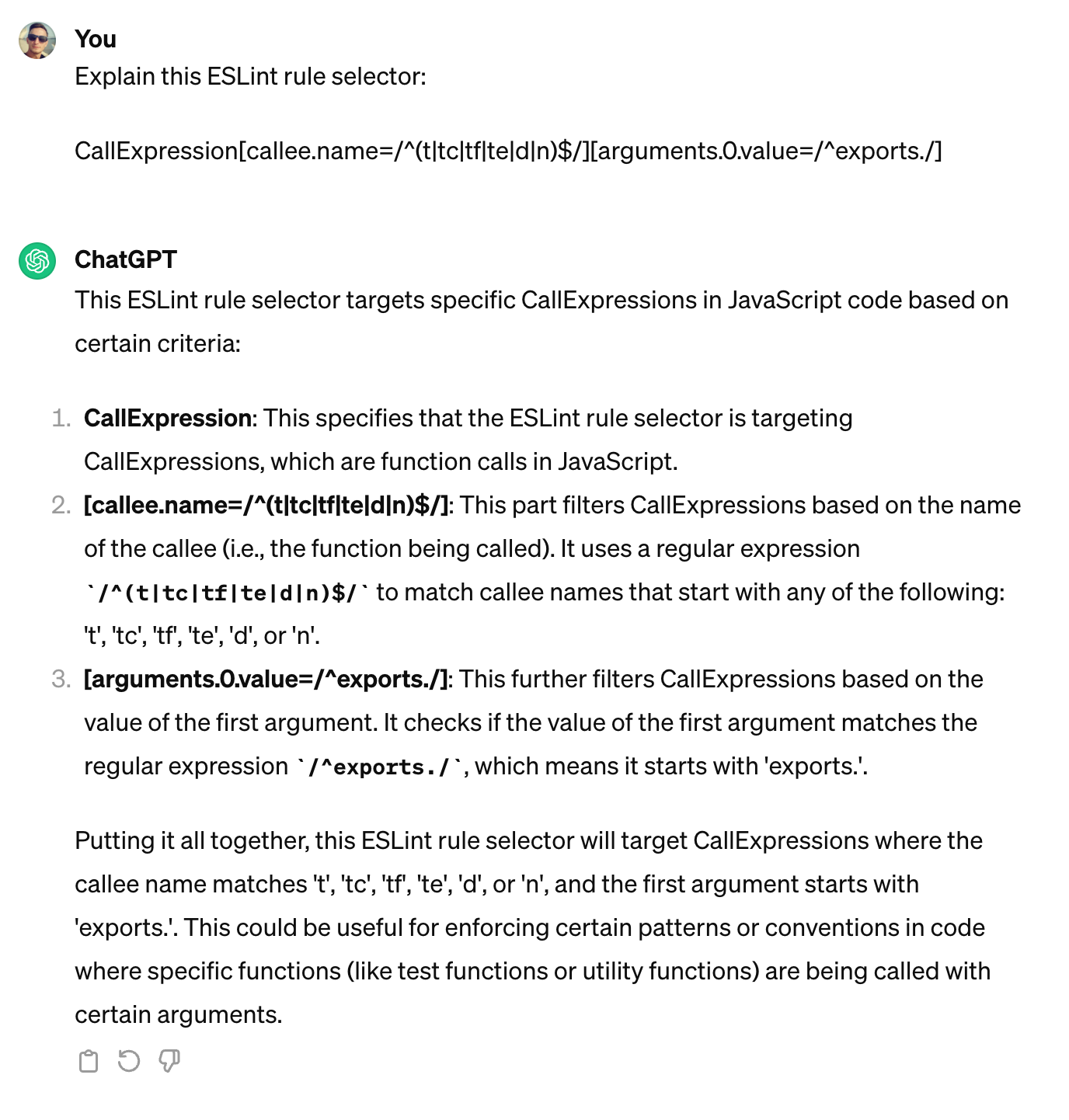
Nico Prat
Restricting some syntax with ESLint
Customizing ESLint to your needs by using the no-restricted-syntax rule

ESlint is a fantastic tool to make our code more consistent, and saves our teams a lot of time. There are a ton of plugins that handle most of the generic use cases, but sometimes we have some specific needs, and creating our own rule would take too much time.
For the simplest cases, when we just want to prohibit usage of a function (or anything else actually), we can leverage a default rule: no-restricted-syntax.
Understanding the Abstract Syntax Tree (AST)#
Before writing our first selector, we need to understand the underlying system. The AST is simply a representation of a program in the form of nested objects (hence the "Tree" in AST), created by a "parser". It's very flexible because it can be easily read, queried and manipulated. The alternative would be to use regular expressions, but that would be very hard to read and write. So it's basically an intermediate step that allows every great things an IDE does by understanding our code.
To understand how it works, we can play with the AST Explorer, a handy tool that shows a bit of code and its AST in parallel, where you can hover or click on any part of the code to highlight its corresponding AST part:

⚠️ Be careful to correctly select the parser when changing the language.
For instance, when writing Vue code, be sure to use the vue-eslint-parser in our case, because we want to write an ESlint selector. You could also inspect what the @vue/compiler-dom outputs, but you won't be able to query the resulting tree with an ESlint rule.
Creating a selector#
The second helpful tool we'll need is the ESLint selectors documentation. It lists the expression we can use to query the AST, and it might feel familiar if you're used to work with CSS. It's based on the same "cascading" behavior, with matchers like descendants, siblings, node and attributes filtering, and so on. Here are some examples from the docs:
- AST node type:
ForStatement - attribute value:
[attr="foo"] - nested attribute:
[attr.level2="foo"] - field:
FunctionDeclaration > Identifier.id
So, given this code:
const time = dayjs();
It will generate the following AST using @typescript-eslint/parser:
Program {
body: [
VariableDeclaration {
declarations: [
VariableDeclarator {
id: Identifier
init: CallExpression {
callee: Identifier {
name: "dayjs"
}
arguments: []
optional: false
}
}
]
kind: "const"
}
]
sourceType: "module"
}
In our case, we need to match a function call (CallExpression) which name is dayjs (Identifier with name property). We also need the direct descendant selector > to be sure we don't match any function call that whould have a dayjs identifier nested within. So the selector will be CallExpression > Identifier[name="dayjs"].
Examples#
Simple function selector#
Here's our selector to prevent dayjs usage without UTC that you can try live in the ESLint Playground:
'no-restricted-syntax': [
'error',
{
selector: 'CallExpression > Identifier[name="dayjs"]',
message: 'Always use dayjs.utc() instead of dayjs() to avoid timezone issues',
},
]
const foo = dayjs();
// ^^^^^ Invalid
const bar = dayjs.utc();
Inside Vue templates#
Here's another example that prohibits a (pretty hacky) way of setting local variables in templates in Vue templates (note that the rule is prefixed by vue/ because it needs the eslint-plugin-vue package):
'vue/no-restricted-syntax': [
'error',
{
selector: 'VAttribute > VExpressionContainer > AssignmentExpression',
message: 'Do not assign values in templates as it will not be reactive',
},
],
<template>
<div :set="(foo = 'bar')">{{ foo }}</div>
<!-- Outputs <div>bar</div> -->
<!-- ^^^^^^^^^^ Invalid -->
</template>
By the way you can read more here about this weird trick that caused us a few reactivity issues in the past, so we decided to prohibit it altogether.
Using regex#
This is the last example, where we had a case where we needed to forbid the usage of a specific set of translations, so we had to find the t (or any variation) function which has a first argument starting with exports.:
'no-restricted-syntax': [
'error',
{
selector: 'CallExpression[callee.name=/^(t|tc|tf|te|d|n)$/][arguments.0.value=/^exports./]',
message: 'Do not assign values in templates as it will not be reactive',
},
],
const translation = t('exports.test');
// ^^^^^^^^^^^^^^^^^ Invalid
Conclusion#
If you struggle to come up with the right selector, you could ask ChatGPT for help! It's good at explaining selectors too:

Also if you need to restrict imports only, it's simpler to use the no-restricted-imports rule:
'no-restricted-imports': [
'error',
{
paths: [
{
name: 'lodash',
importNames: ['default'],
message:
"Please import lodash methods directly to allow tree-shaking, e.g. 'import { map } from 'lodash';'",
},
],
},
]
This solution works great in the simplest situations, but it won't let you propose an autofix. For more complete solutions, a custom rule should be created instead.
Thanks to those rules, we save time by not repeating the same mistake twice!



